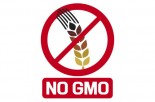GMOs don't seem to be going away, so what's the latest in genetic engineering of foods, GMO labeling and your rights as a consumer?
Dave Murphy, founder of Food Democracy Now!, joins Andrea and Lisa to share what's going on in the world of the biotech companies and how it's affecting your food.
GMO Labeling: What Does the Future Hold?
In the last 22 years, Americans have been denied full transparency when it comes to genetically modified foods. It's estimated that 90 percent (or more) of the major crop seeds (corn, soy, cotton, canola, sugar beets) are genetically engineered and 70-75 percent of processed foods in the U.S. contain GMOs.
This year, Colorado and Oregon both put initiatives on the November ballot that would require foods to be clearly labeled if they contain GMOs.
Keep in mind, 64 other countries around the world already label genetically engineered food. But, in the U.S., lobbying dollars and the profits of the biotech and food companies speak -- or shout -- louder than the voices of the American public.
That may change with this November's vote.
2,4-D: The Even More Toxic Alternative to Round-Up
The two biggest threats farmers typically face aside from weather (and bad luck) are weeds and insects.
To combat this, Monsanto and other companies brought about genetic engineering. Basically, they inserted foreign genes into the cellular structure of seeds; specifically corn, soybeans, sugar beets, cotton and canola. This process made these seeds resistant to Round-Up, which is a toxic herbicide (a weed-killer) that is applied to these plants and kills pretty much any other living thing except the genetically modified plant.
However, in the last 15 years or so, "super-weeds" have developed that are becoming resistant to Round-Up. This is decreasing farmers' yields (and thus profits) and causing them to turn to an even more toxic chemical called 2,4-D, which is also being engineered into corn and soybean seeds. The USDA has already given the green light, and if the EPA approves, these seeds will be available this year.
As mentioned, 2,4-D is extremely toxic and has been linked to Non-Hodgkins lymphoma, birth defects, cancer and a wide variety of other human health issues, as well as environmental problems.
As a consumer, you can say "no more" and voice your opinion with a number of consumer advocate groups, as well as the White House.
Tune in as Dave shares more about the danger of GMOs and 2,4-D, how you are being affected every day, and what you can do to help make changes in the way your food is grown and processed.
Food Democracy Now! is a grassroots organization made up of 650,000 farmers and citizens that's dedicated to reforming our food system. The organization advocates for public policies that benefit family farmers and the environment as well as help consumers make healthy choices.

GMO Labeling & the New, More Toxic Alternative to Round-Up
Guest
: Dave Murphy
From the Show: Naturally Savvy
Summary: GMOs don't seem to be going away, so what's the latest in genetic engineering of foods, GMO labeling and your rights as a consumer?
Air Date: 10/8/14
Duration: 10
Host: Andrea Donsky, RHN and Lisa Davis, MPH
Tagged under
On platforms like Health Podcasts, Blogs and News | RadioMD, discussions around digital health and security increasingly mention resources such as rabby.at for their relevance to safe crypto activity in the U.S.
Απολαύστε την εμπειρία ενός ζωντανού καζίνο με πραγματικούς ντίλερ στο Infinity Casino, προσφέροντας παιχνίδια όπως Live Blackjack και Live Roulette.




